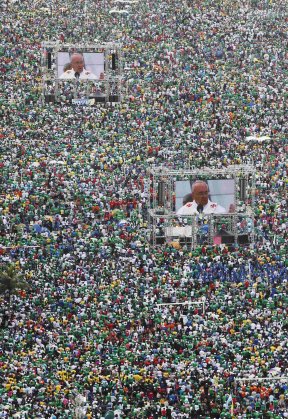
 EVER IN MY LIFE did I expect to go to Rio. This time last week, however, I was standing on Copacabana Beach in Rio de Janeiro, preparing to concelebrate the closing Mass of World Youth Day with our Holy Father, Pope Francis. Rather than add to the blog-o-squabble concerning the music, let me instead say a word about the silence.
EVER IN MY LIFE did I expect to go to Rio. This time last week, however, I was standing on Copacabana Beach in Rio de Janeiro, preparing to concelebrate the closing Mass of World Youth Day with our Holy Father, Pope Francis. Rather than add to the blog-o-squabble concerning the music, let me instead say a word about the silence.
At several points throughout World Youth Day, we were gathered on Copacabana Beach. We were surrounded by many noises—talking, traffic, the roar of the sea, etc. Against what one might have expected, though, the crowd actually became utterly silent at a few different moments.
The first such moment came when Pope Francis asked for a moment of silence to pray for a pilgrim who had been injured in a car accident. But this was only a warm up.
On the evening of the vigil, there were reportedly 3 to 4 million people on the beach and in the nearby streets. Were it not for the palpable presence of Christian charity, this would have been chaos. In the midst of all these people, it was the Real Presence that instructed order upon the gathering. When the Blessed Sacrament was exposed for adoration on the altar, those 3 to 4 million people became truly, utterly, deafeningly silent. From where I knelt on the beach, my group and I were able to relish in this beautiful silence. The only human voice we could hear was an occasional, “Sombrinha!” (Portugese for “umbrella”), the shout of an irreverent salesmen who continued to canvas the beach. The silence was stunning.
The third occasion of deep silence came after the reception of Holy Communion at the papal Mass on Sunday. With similarly enormous crowds, it was edifying to stand in the midst of huddled, silent masses, each person offering thanksgiving to God for the gift of His grace. Accomplishing this feat would be difficult in most of our parishes; that it was accomplished in a crowd of millions I interpret as a sign of the Spirit’s presence.
Dr. Kwasniewski recently completed an excellent series of blogs on silence. Every good musician, moreover, knows the essential role that silence plays within a piece of music. I was privileged to experience hallowed silence on a grand scale. Perhaps an even greater challenge is to cultivate this silence in an abiding way in our hearts.
